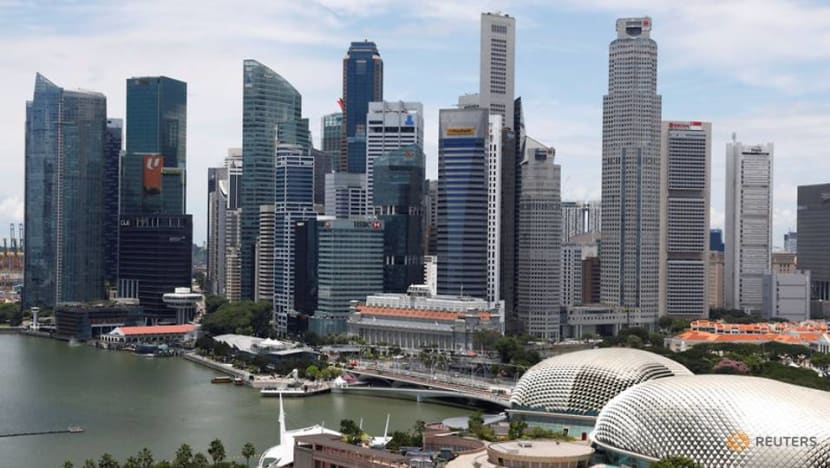'Still too early to work out exact impact' of global corporate tax reform: Lawrence Wong

A view of the skyline in Singapore, Sep 12, 2018. (Photo: Reuters/Edgar Su)
SINGAPORE: While the recent proposal of new global tax rules concerning multinational companies (MNCs) may affect Singapore's corporate income tax revenues and limit the effectiveness of its tax incentives, it remains “too early to work out the exact impact”, said Finance Minister Lawrence Wong on Monday (Jul 5).
Singapore will change its corporate tax system after a global consensus is reached on the matter and will do so in consultation with the industry. It will also work “even harder on non-tax factors” to ensure that it remains competitive and attractive to investments, the minister added in response to several questions from Members of Parliament (MPs).
The Group of Seven (G7) nations reached a landmark accord in June to back the creation of a global minimum corporate tax rate of at least 15 per cent and put in place measures to ensure businesses pay taxes in countries where they earn their profits, regardless of whether they have a physical presence.
READ: What is a global minimum tax and what will it mean?
Last week, 130 countries supported the proposed reform plan at talks held by the Organisation for Economic Cooperation and Development. Singapore was one of them, Mr Wong told the House on Monday.
But this remains far from a done deal as global discussions on the design of specific rules and implementation details continue.
The broader agreement will next go to the Group of Twenty (G20) major economies for political endorsement at a meeting in Venice this week.
WHAT IT MEANS FOR SINGAPORE
Speaking in Parliament, Mr Wong first sought to explain how the two sets of proposed changes could possibly affect Singapore.
The first concerns the reallocation of taxing rights to countries where the customers of MNCs are based, and will apply to businesses with global revenues above 20 billion euros and profitability above 10 per cent.
He cited the example of an MNC based in Singapore with a profitability of 15 per cent. Under the proposed new rule, the excess profit, which in this case is 5 per cent, will be reallocated from Singapore to be taxed in other markets.
“This means that hub economies with smaller markets like Singapore will stand to lose corporate income tax revenues,” said Mr Wong.
READ: What the G7’s global tax reform plan could mean for Singapore
The second is the proposal of a new minimum tax rate of at least 15 per cent on companies with turnover above a threshold of 750 million euros.
“Broadly speaking, this means that if an MNE (multinational enterprise) group in Singapore is taxed at an effective rate of, say 10 per cent, then its home jurisdiction will impose additional rules to require the group to pay an additional 5 per cent in tax there,” said Mr Wong.
This, therefore, limits the effectiveness of tax incentives as a tool to encourage larger businesses to invest in Singapore, he added.
Currently, Singapore’s headline corporate tax rate is at 17 per cent but the effective tax rate of many businesses may be lower than that, or even the proposed global minimum, due to tax reliefs as well as tax incentives awarded to those with qualifying activities that are beneficial to the country’s economic development.
Mr Wong said about 1,800 MNCs in Singapore would fall under the criteria of the new global rule and “a majority” of them pay taxes of below 15 per cent at the moment.
“However, at this stage, it is still too early to work out the exact impact of the tax proposals,” he added.
“The final number of affected MNEs, as well as the extent of the impact, depends on the design of the specific rules which are still being actively discussed at the IF (the OECD/G20 Inclusive Framework).”
“As some of the tax proposals can only be effected through a multilateral instrument, there will be a need for international consensus to be fully reached before the changes can be implemented,” Mr Wong said.
Similarly, Singapore will “only be able to determine with a high degree of confidence what the eventual impact on (its) fiscal position would be” once the detailed design elements of both proposed tax changes are worked through and agreed on.
The eventual impact will also depend on how companies and other governments respond to these international developments, the minister added.
WHAT WILL SINGAPORE DO
Once a global consensus is fully reached, Mr Wong said Singapore will adjust its corporate tax system as needed, in consultation with the industry.
Any adjustments to the tax system will be guided by three principles - abiding internationally agreed standards, safeguarding the country’s taxing rights and minimising compliance burden for businesses.
But the best response to tax changes is to continue to strengthen Singapore’s overall competitiveness, reiterated the minister, adding that a conducive tax environment “is not the decisive factor” in the country’s ability to attract investments.
READ: Singapore will ensure its tax system is compatible with international norms while managing burden on businesses: Lawrence Wong
What are “far more important factors” include having quality infrastructure, good connectivity, a skilled workforce, an open and business-friendly regime founded on the rule of law – all of which are competitive strengths that Singapore must “double down” on.
“The upshot of these tax changes … is that it will make it harder for Singapore to attract investments - there should be no doubt so let's be realistic about what the impact will be,” Mr Wong said.
“So on our part, we will therefore have to work much harder, whether it’s on upgrading of our workforce, our infrastructure, our connectivity, our overall business environment. All of these factors would therefore become more salient in our ability to attract and retain investments, and ultimately with the objective of creating good jobs for Singaporeans,” he added.
Addressing a similar parliamentary question, Trade and Industry Minister Gan Kim Yong said Singapore is also enhancing its competitiveness and making improvements to its business environment through efforts such as the Industry Transformation Maps.
He added that Singapore will continue to invest in its infrastructure to allow companies to operate in a “very cost-effective manner” and extend its connectivity through more free trade agreements. On the latter, authorities are looking for new opportunities, such as trade agreements involving renewable energy and the digital economy.
"Over the last few weeks since I took on the job, I've been talking to our counterparts in other countries almost on a daily basis, to develop new connections to allow our companies to expand beyond the confines and the limitations of our physical size," he said.
"We will also want to encourage companies to invest in productivity and upgrading so that they can continue to be cost effective," he added, pointing to the various support schemes available.












